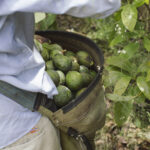"Volatility is costly too": Proposed tariffs and their effect on California's agriculture

UC Davis Agricultural and Resource Economics Professor Colin Carter spoke with us before President Donald Trump was elected about his protectionist policies and the danger they pose to the future of California's agricultural trade.
In his expectations, he mentioned that the state has become increasingly reliant on China, with a little under 9% of its exports headed to the Asian country. The bipartisan sentiment to impose tariffs on the country could hurt the state's growers, farmers, and exporters.
Now that President Trump is back in office, tariffs are looming. However, not yet a concrete issue that we need to deal with, Carter speaks with Freshfruitportal.com about California producers' sentiments in the face of uncertainty and looming tariffs.
When asked about his predictions, he said he couldn't anticipate what might happen in the industry, even with a deep understanding of the subject, due to the President's sudden decision changes. However, he believes these sudden shifts are causing volatility in the market and in agriculture.
"It's leading to producers holding back on decisions and investments," Carter explains. "Take the most basic example, as a farmer, you're not trying to spend a lot of money right now in your business because you don't know what is coming, so more farmers would not be buying machinery, processors wouldn't invest in plans, so I think that the uncertainty angle is one that's not talked about too much, but I think it's extremely important."
"Higher tariffs will lead to higher prices, and higher uncertainty will also lead to higher prices," he adds.
For the growers, he explains, if Canada retaliates with tariffs, that will hurt California producers, and if Mexico retaliates, consumers will suffer the most.
"California exports 40% of its production, and when people talk about these trade wars, the general story is that Canada and Mexico are more reliant on trade than the United States on average. That's true, but when you look at individual sectors, the ones that will be hurt are those that trade accounts for a large part of their production."
Carter says the regulations are leaning towards protectionism. However, growers are exploring new markets instead of relying on local consumption.
"More important than the realignment towards domestic consumption is the realignment in terms of trade, it's more costly to do it that way, but that's the way you can get around the tariffs."














































